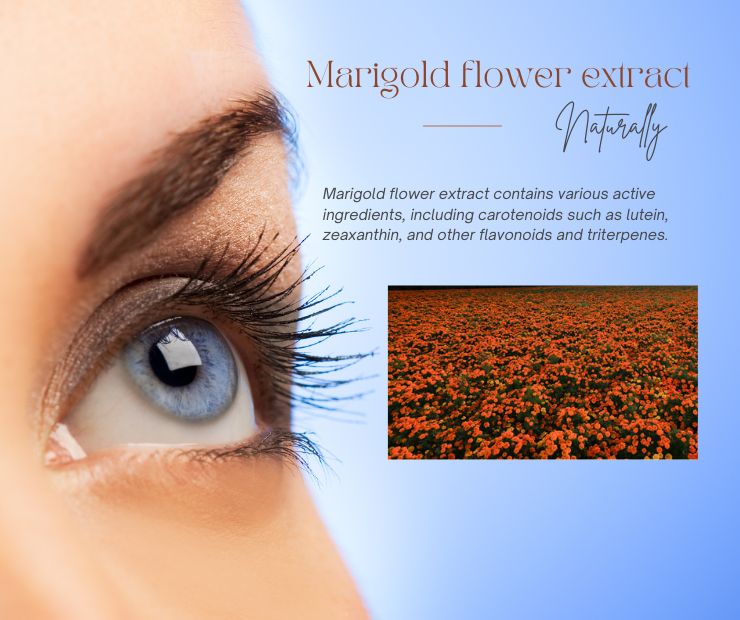Why is marigold flower extract so famous for eye health?
Marigold flower extract is derived from the marigold plant’s flowers, also known as Calendula officinalis. The section is typically obtained using solvents or other methods to separate the active compounds from the plant material. Marigold extract is often used in skincare and cosmetic products due to its anti-inflammatory and antioxidant properties. It is also used in dietary supplements and herbal remedies for its potential health benefits, such as reducing inflammation, promoting wound healing, and supporting eye health. The extract contains active ingredients, including carotenoids such as lutein, zeaxanthin, and other flavonoids and triterpenes.
Specification information:
The specification of marigold flower extract can vary depending on the manufacturer and intended use of the product. However, the most common active compounds in marigold flower extract are lutein and zeaxanthin. The percentage of these compounds in the section can range from 5% to 90%.
Here are some common specifications for marigold extract:
Lutein content: 5%, 10%, 20%, 50%, or 80%
Zeaxanthin content: 5%, 10%, or 20%
Lutein and zeaxanthin combined content: 5%, 10%, 20%, 50%, or 80%
The solvent used for extraction: ethanol, methanol, or hexane
Purity: 95%, 98%, or 99%
Function:
Marigold flower extract can be used in various ways depending on the intended purpose. Here are some common ways to use marigold extract:
- Skincare: it often uses in skincare products due to its anti-inflammatory and antioxidant properties. It can be added to facial creams, serums, and masks to help soothe and protect the skin. Apply the product containing marigold flower extract to the face as directed.
- Eye health: it is rich in lutein and zeaxanthin, which are essential for eye health. It can be used in dietary supplements or eye drops to support healthy vision. Follow the instructions on the product label for dosage and usage.
- Wound healing: it has been used traditionally to promote wound healing. It can be applied topically to wounds or added to wound dressings to help reduce inflammation and promote tissue repair. Follow the instructions of the wound care professional or product label for usage.
- Cooking: it can be a natural food coloring, particularly for egg yolks and baked goods. However, it’s important to note that marigold flower extract is typically highly concentrated and should be used sparingly to avoid an overpowering taste or color.
It’s important to note that the usage and dosage of marigold flower extract may vary depending on the product and intended use.
Useful literature
Especially regarding eye health, there is much literature on this aspect, such as:
- “Lutein and Zeaxanthin Isomers in Eye Health and Disease” by John M. Nolan, Stephen Beatty, and David R. H. Burns. Annual Review of Nutrition, 2013.
This review article discusses the role of lutein and zeaxanthin in promoting eye health, particularly in preventing age-related macular degeneration (AMD). The authors highlight several studies demonstrating the efficacy of lutein and zeaxanthin supplementation in reducing the risk of AMD and improving visual function. Marigold flower extract is a rich source of lutein and zeaxanthin and is often used in dietary supplements for eye health.
- “Effects of dietary zeaxanthin and lutein supplementation on macular pigment optical density in postmenopausal women” by Kelly M. Greenberg et al. Journal of Ophthalmology, 2014.
This study investigated the effects of lutein and zeaxanthin supplementation on macular pigment optical density (MPOD) in postmenopausal women. The participants were given a daily supplement containing marigold flower extract, lutein, and zeaxanthin for six months. The results showed a significant increase in MPOD in the supplementation group compared to the placebo group, suggesting that marigold flower extract may help improve macular health.
- “A randomized, double-blind, placebo-controlled study of oral antioxidant supplement therapy in patients with dry eye syndrome” by Kazuo Tsubota et al. Clinical Ophthalmology, 2016.
This study investigated the efficacy of an oral antioxidant supplement containing marigold flower extract, vitamins C, E, and other antioxidants in treating dry eye syndrome. The participants were given the supplement or a placebo for 12 weeks. The results showed that the supplement group significantly improved tear production and subjective symptoms compared to the placebo group, suggesting that marigold flower extract may help improve dry eye symptoms.
These are just a few examples of the literature on marigold extract and eye health. It’s important to note that more research is needed to fully understand the effects of marigold extract on eye health and determine optimal dosages.



Comments
Post a Comment